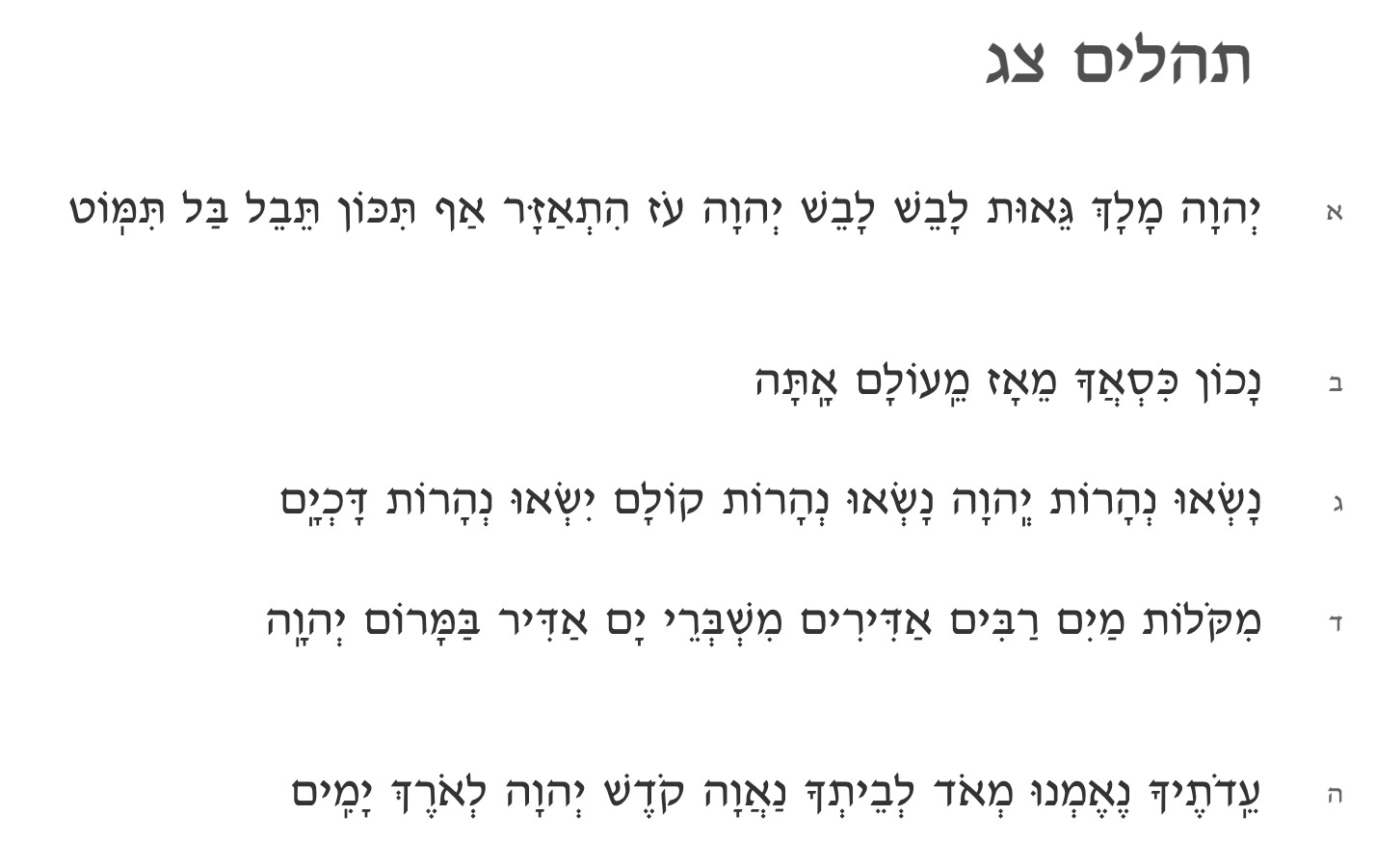Compare the NKJV rendition of the terse and tasty Psalm 93, to my rendition as follows:
The Lord reigns, He is clothed with majesty;
The Lord is clothed,
He has girded Himself with strength.
Surely the world is established, so that it cannot be [a]moved.
Your throne is established from of old;
You are from everlasting.
The floods have lifted up, O Lord,
The floods have lifted up their voice;
The floods lift up their waves.
The Lord on high is mightier
Than the noise of many waters,
Than the mighty waves of the sea.
Your testimonies are very sure;
Holiness adorns Your house,
O Lord, forever.
vs.
yahweh kings, he is clothed with pride;
yahweh is clothed,
he has girded himself with strength.
surely the world is established, so that it cannot be moved.
your throne is established from of old;
you are from the beginning of the world.
the floods have lifted up, yahweh,
the floods have lifted up their voice;
the floods lift up their waves.
yahweh on high is mightier
than the noise of many waters,
than the mighty waves of the sea.
your testimonies are very sure;
holiness adorns your house,
yahweh, for length of days.
Context matters, always and everywhere. Pride on the human being looks terrible. Pride on God looks majestic. Know the difference.
The biblical hebrew לבש (lbsh): to be clothed in, is a cognate of the ge’ez and amharic ለብሰ (lebse), as in እግዚአብሔር ፡ ነግሠ ፡ ስብሐቲሁ ፡ ለብሰ (igzeeabhér negse, sibhateehu lebse; which is the first line of this same Psalm rendered in ge’ez, numbered according to the Old Greek text as Psalm 92). Notably the isatu s is used in the ge’ez lebse, instead of the expected nigusu s which was originally our sh, and is used in the word negse (to reign, to king) here.
Everlasting here is מעולם (m3lm/malm/méolam) which is a cognate of the ge’ez and amharic ዓለም (3lem/alem). Meaning something like, from the beginning of the world. World here not being just planet Earth, but the complete cosmos, the universe as a totality. Whether it is one, as the big bangers say. Or a multiverse as Stan ‘The Man’ Lee, and the string theorists say.
Lifted up, or raised up, here is נשאו (nshaw/nasiu) which is a cognate of the ge’ez ተንሥኡ (tensiu) arise or stand, as in the call by the deacon to the faithful, which millions of the faithful plainly understand, arise for prayer / stand up for prayer. Or the nigh equally well-known paschal hymn, አማን በአማን ተንሥአ እምነምውታን (aman beaman tensia imnemwtan) truly, truly, he has been raised from the dead.
Their voice here is קולם (qwlm/qolam) which would literally be in ge’ez ቃሎሙ (qalomu), and amharic ቃላቸው (qalachew), but dynamically we have the ge’ez ድምፆሙ (dimtsomu), and amharic ድምፃቸው (dimtsachew), as thier voice. And in שברי ים (mshbry ym/meeshberéy yam) breakers of the sea, I spy שבר (shbr/shebere) which is clearly a cognate of the ge’ez and amharic ሰበረ (sebere) he broke. Pronounced with gemination in amharic and without in ge’ez, but spelled the same way.
נאמנו (namnw/neamenu) is the surety of his testmonies. Its ge’ez cognate is ነአምን (neamn) we believe; we trust; we are very sure; we are certain; we hold it to be true. እሙን (imun) trustworthy in this Psalm, and የታመነ (yetamene) in amharic,
As we close, we approach לביתך נאוה קדש (lbytk nawh qdsh/ lebeytka neaah qodésh) which should be rendered in ge’ez ለቤትከ ይደሉ ቅድስና (lebétike yidelu qdsna) but since it is mediated by Old Greek and Syriac and Arabic, instead we get ስብሐት (sibhat) glory instead of ቅድስና. C'est la vie, mon ami. Such is life, my friend.
P.S.
Here is the full Psalm in ge’ez:
እግዚአብሔር ፡ ነግሠ ፡ ስብሐቲሁ ፡ ለብሰ ፤
ለብሰ፡ እግዚአብሔር ፡ ኀይሎ ፡ ወቀነተ ፤
ወአጽንዓ ፡ ለዓለም ፡ ከመ ፡ ኢታንቀልቅል ።
ድልው ፡ መንበርከ ፡ እግዚኦ ፡ እምትካት ፤
ወእስከ ፡ ለዓለም ፡ አንተ ፡ ክመ ።
አልዐሉ ፡ አፍላግ ፡ እግዚኦ ፤
አልዐሉ ፡ አፍላግ ፡ ቃላቲሆሙ ።
ያሌዕሉ ፡ አፍላግ ፡ ድምፆሙ ።]
እምቃለ ፡ ማያት ፡ ብዙኅ ፡ መንክር ፡ ተላህያ ፡ ለባሕር ፤
መንክርሰ ፡ እግዚአብሔር ፡ በአርያሙ ።
ስምዐ ፡ ዚአከ ፡ እሙን ፡ ፈድፋደ ፤ ለቤትከ ፡ ይደሉ ፡ ስብሐት ፤
እግዚኦ ፡ ለነዋኅ ፡ መዋዕል ።




